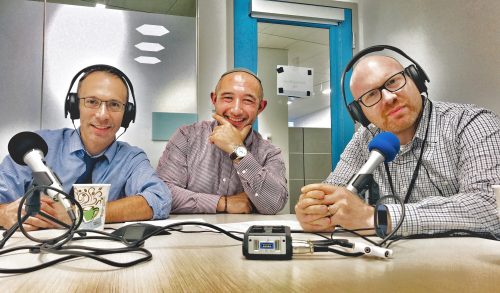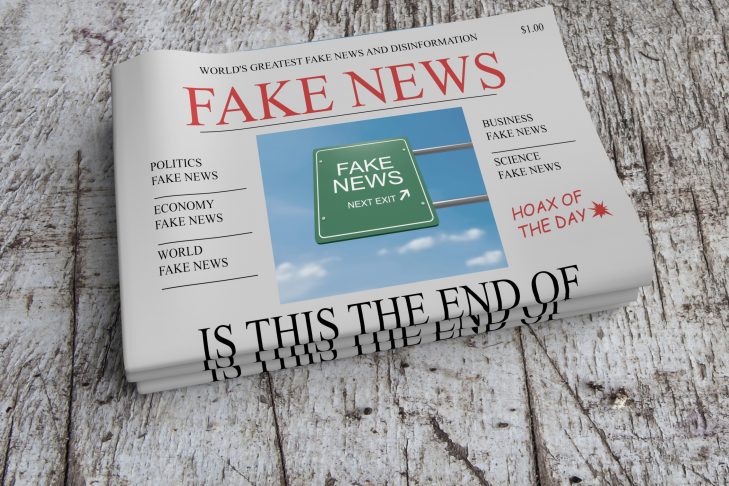Before there was a hashtag for it, Joe Hyams was spotting #fakenews for a living. As CEO of HonestReporting.com, Joe and his team scour the world’s media for misrepresentations, distortions, and outright lies about Israel. Naturally, it’s a full-time job. But we were lucky enough to catch up with Joe in Boston for an israel360 podcast. You can listen to the entire conversation below.
israel360: Welcome, Joe. Getting right to the questions—media bias is something that’s been around for a long time. Now, we have this idea of “fake news.” What’s changed in the past year or so? Or has anything changed?
Joe Hyams: Who heard the word before? Let’s call it about 10 months plus a campaign season ago, and fake news has become a catch-all that I think has come to mean “stuff that I don’t like” in many circles. It’s important that we distinguish between news that is generated with intent to politically mislead or to create some kind of public perception that has people, I guess, vote with their feet or act in a certain way. And then there’s the kind of bias that I’ve been dealing with for many years, as you mentioned, which can be a whole host of either lack of attention to detail in news making, or it can be a narrative which looks to find stories to support a preconceived notion of what should or shouldn’t be. And those categories of bias have been my work. We’re seeing this conversation about fake news really merge into the world that I’ve been working in, but it’s exciting because it means that we’re starting to raise the conversation where a broader audience in cases just about Israel is actually coming around to recognizing that, “What I read, what I see, what I hear, may not be the whole picture.”

israel360: You mentioned how anti-Israel bias plays into that, but it’s different than fake news, right? There’s something else going on.
Joe Hyams: That’s right. Bias in the classic sense of news making and in injecting one’s own agenda, or being careless, or playing around with the facts before you. That kind of bias is a manipulation, or a misdirection, or misinformation; it’s not something that’s new and it isn’t the same as engineering entire fabricated stories and injecting them into the news cycle in the hope that people will believe that they’re true. So it is something else, it’s particularly dangerous in its own right, and we’ve made progress in the years to raise awareness of it, but it isn’t the same thing as fake news, but fake news has a place amongst the very many ways in which anti-Israel bias can harm what people feel and think about Israel and Jews around the world.
israel360: For me, the most jarring—and perhaps frequent type of fake news—is when you see a headline after a terrorist attack. A terrorist will approach a checkpoint, start stabbing people randomly, will get shot, and it’ll say, “Palestinian killed in a shooting.”
Joe Hyams: What I find so revealing about the headline bias is that you’re having people who are writing a story under time pressure. And you often see people’s true colors come out when they’re pushed in a very short time to create a sentence that sums up the story. Now, in the headline that you just imagined, that you just described, which of course is a real headline, there was nothing untrue about that headline, right? Technically, that’s not fake news. That’s an event that happened, but the way in which it was described leaves the news consumer with a different impression of the intent of the various parties than what actually happened on the day, and that’s the bias. It’s not fake and it is biased.
israel360: So it’s not fake news because it’s technically correct?
Joe Hyams: We had time after time through the stabbing attacks of ’15 and ’16 where there were actually a couple of forms of bias in the headline you just described. You often have the passive and active tense used almost subconsciously by journalists who feel that Israelis are the ones doing the killing, so a Palestinian was killed. Whereas, an Israeli died even if the Palestinian was the active party initiating the violence. But also, you see this scorecard journalism whereby the news is framed as being literally a basketball game. Who scored the most points on each side? And that cheapens and that diminishes the intentions and the considerations of the story itself. It means that when two Palestinians are shot on the Temple Mount, there is no reference in that story or that lead or the opening paragraph to the fact that they were shot by those who had been storing weapons in the most holy site to Judaism and what is also today a mosque that was supposed to be a holy site out of bounds for storing weapons. So where the story leads off is also the responsibility of the journalist. And even if the story and the headline is accurate, should that even be the way in which the journalist leads the conversation? And oftentimes the answer is no. They are playing out a story which they had already preconceived and waiting for an event to frame or to headline that story, and that’s a problem. And in that you just see people revealing their true colors of the world is supposed to be where the mighty Israeli IDF that’s armed and strong is the one doing the killing and the ones who are impoverished. I’m of course paraphrasing and I’m citing here Palestinian voices or sympathetic voices who are impoverished, have no agency of themselves, who are simply reacting to events, they’re the ones who are doing the dying. And in that you build an impression in people’s minds. So yes, we’re calling the media to use a fair and equal vocabulary set.
israel360: For a news consumer, what are some telltale signs of fake news or that sort of confirmation bias? How do you spot it? Is there a consistent pattern that you can find as a consumer?
Joe Hyams: You can usually smell a fake news story in all but the most sophisticated of cases. For example, state engineered messaging en masse over a long period of time, those things can be much harder to deal with on a consumer level. And maybe consumers shouldn’t be dealing with it. But for the most part, when you see that something is being shared rapidly amongst your bubble and it seems to be a little sensational, the writer is unknown, the source is not something you’re familiar with, and the claim seemed just a little bit too outrageous. If it seems unlikely that an unnamed source claims there was just a massacre in Jenin, that’s fake news until established otherwise. Our intuition is a bit stronger today than it once was. We don’t fall for things so easily. We’ve all become aware how any of us with a steady hand and an iPhone can actually make pretty compelling videos that look real. And we know there’s always another side to that story. On the flip side, we do know that Americans, I have to tell you, Americans are much more likely to share unsubstantiated news, sensational claims than Europeans. As in Europeans are inherently more suspicious, according to a study I just read. And that means that we’re much less trusting of our friends, as Europeans. It means Americans, in a complimentary way, we’re much more trusting of what our friends, and our parents, and our families share with us. We don’t ask our sister, “Sister, are you sure? Where’d you get this from?” “Oh, I don’t know, my friend, I just clicked like.” So we have to actually become more responsible. Social media may be free but it has a price and that means thinking before we share. If it doesn’t seem plausible, pause, check it out, find a second site that’s carrying the story and from there you may have better grounds to share it.
Listen to the entire podcast by clicking below. And be sure to download the israel360 app for all the latest AMAs, conversations, and podcasts all in one place on your iOS device.
This post has been contributed by a third party. The opinions, facts and any media content are presented solely by the author, and JewishBoston assumes no responsibility for them. Want to add your voice to the conversation? Publish your own post here. MORE



